West Coast, NZ
Top-Rated Attractions on the West Coast, NZ
Remote and rugged, the West Coast of New Zealand's South Island is one of the most pristine wilderness areas in the world. Only 31,000 people call the West Coast home, with the tiny settlements and towns scattered across a narrow coastline squeezed between the mighty Southern Alps and the Tasman Sea.
The big-sky scenery here of vast native forests, jagged peaks, and lonely driftwood-strewn beaches is New Zealand at its most beautiful and a major draw card for anyone looking for a heady dose of lush green nature.
Trekking, hiking, mountain biking, kayaking, and boating are all major activities, although even the less adventurous can experience the West Coast's biggest tourist attractions. Both Franz Josef and Fox Glacier and the famed Pancake Rocks can be viewed by taking short, easy strolls, while a journey on the renowned TranzAlpine Railway lets you simply sit back while the scenery rolls past.
For ideas on how to spend your sightseeing time here, as well as details of things to do, be sure to review our list of the top attractions on the West Coast.
1. Franz Josef Glacier
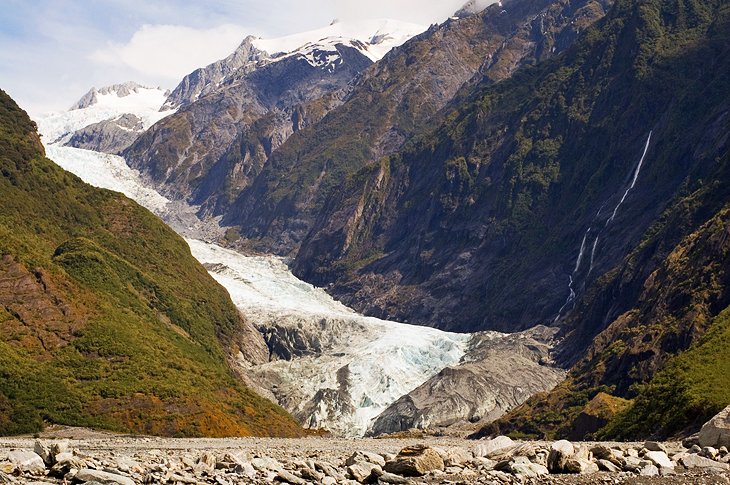
A key tourist attraction in this region, the Franz Josef Glacier is one of only three places in the world where a glacier descends into temperate rainforest. Fox Glacier (described below) is another, with the only other example being in Argentina. The glaciers here are located within Westland Tai Poutini National Park.
Due to the glacier being 250 meters above sea level, it is easily accessible. Travelers descend upon the tiny village of Franz Josef (population 330) to walk the easy 45-minute Glacier Valley Trail up to the viewing platform in front of Franz Josef Glacier's face.
For a more exciting and unique experience that will allow you to get right out on the glacier, consider a Franz Josef Glacier Heli-Hike. This tour takes a little over three hours and offers an opportunity of a lifetime. Fly over the glacier, then get out and hike on the ice.
2. Hokitika and the Hokitika Gorge
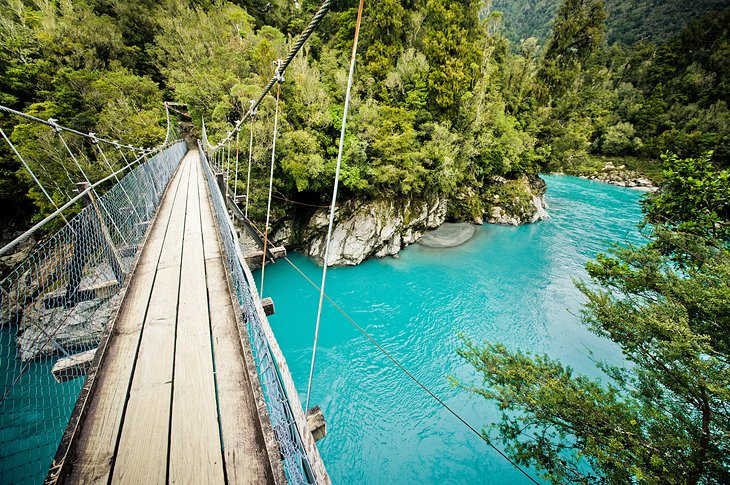
The old gold mining town of Hokitika is the West Coast'smain tourism hub, hugging a wild and rugged strip of beach with clear views over the peaks of the Southern Alps to the east. It is a center of pounamu (New Zealand greenstone) production, and there are many boutiques to browse, showcasing a fine array of pounamu jewelry and carvings, as well as a clutch of other local artisan stores.
Just outside of town is Lake Kaniere with plenty of swimming and boating opportunities, while Hokitika Gorge with its aquamarine water surrounded by dense native forest offers great half-day hikes. Book lovers will also want to dally in town for a while, as this is the setting for the Booker Prize winning novel The Luminaries, which detailed life here during the gold rush.
Other fun things to do in Hokitika include relaxing on the town's beach, or visiting the Hokitika Museum for its displays and exhibits relating to local history.
3. Fox Glacier
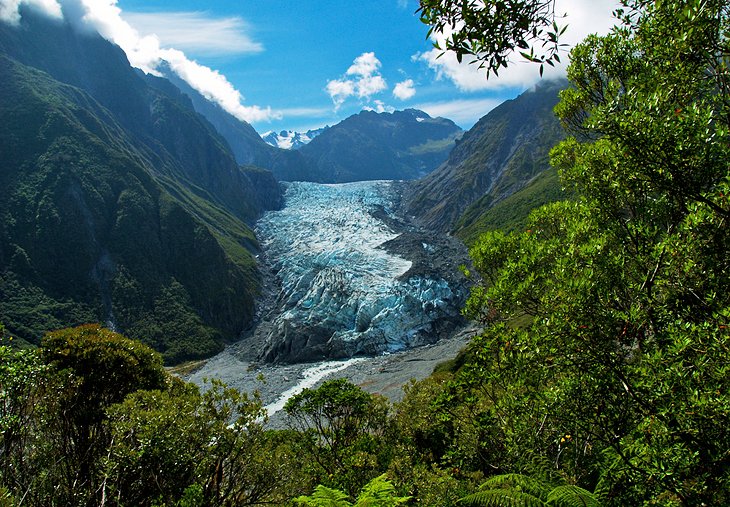
Like Franz Josef Glacier to the north, Fox Glacier is one of the few places in the world where you can easily view a glacier without being a mountaineer. The glacier's terminal face is rimmed by temperate rainforest and descends to 300 meters above sea level. Visitors can enjoy views of the glacier terminal by walking the one-hour Fox Glacier Valley Trail and, like at Franz Josef, take a guided hike onto the ice itself. To get a panoramic overhead view of the glacier, hike the steeper Chalet Lookout Track.
Those wanting to walk on the glacier should consider a tour. You can Heli Hike Fox Glacier on a four-hour guided tour. Everything, including equipment is included.
4. TranzAlpine Railway
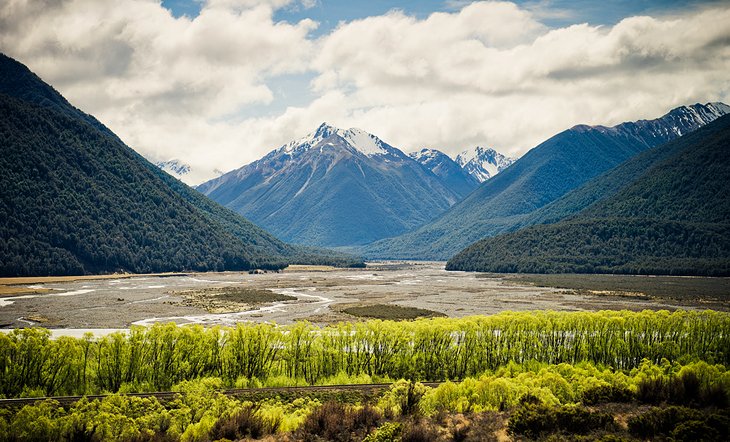
It's called one of the world's great train journeys for good reason. The TranzAlpine Railway travels between Christchurch (in Canterbury on the South Island's east coast) to Greymouth (the largest town on the West Coast) via the breathtaking scenery of the Southern Alps.
Starting from the rolling farmland of the Canterbury Plains, the train soon ascends into the alpine landscape that forms the backbone of the island, rimmed by snow-capped peaks, with the rail line traversing astoundingly high viaducts before descending into the lush native forests of the west coast.
There are scenic stops along the way, and an open-air viewing platform allows passengers to snap fantastic photographs of the scenery as they travel. The one-way journey takes close to five hours, and adding to the experience are the four viaducts and 16 tunnels you'll travel over and through along the way. For sustenance, take a few snacks of your own or, better still, pay a visit to the Cafe Carriage.
5. Punakaiki & the Pancake Rocks
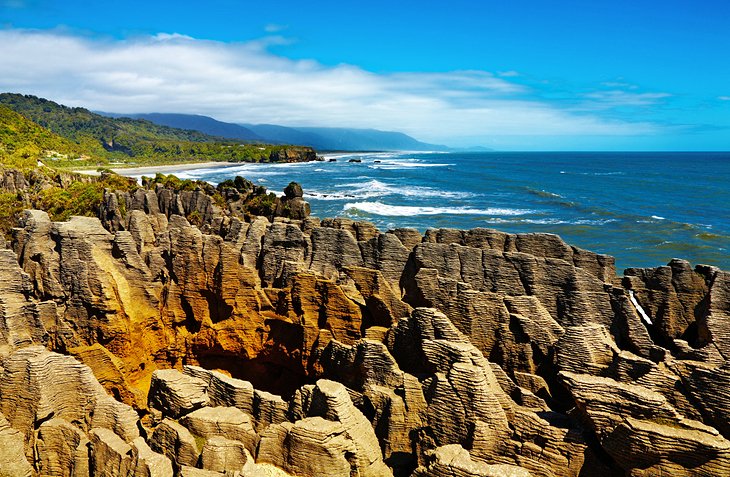
Near the tiny settlement of Punakaiki, at Dolomite Point, are the famous Pancake Rocks. These limestone formations were carved by the erosive effects of water and wind over 30 million years, leaving behind bizarre layered rock towers that look like stacks of pancakes. Amid the rocks are various blowholes where salt spray whips up.
The Pancake Rocks are part of Paparoa National Park, and as well as the Pancake Rocks Walk (which takes around 20 minutes) there are various other trails to explore in the vicinity. In particular, the Truman Track down to the beach is a lovely, easygoing trail through a rather beautiful swath of native forest.
6. Westland Tai Poutini National Park
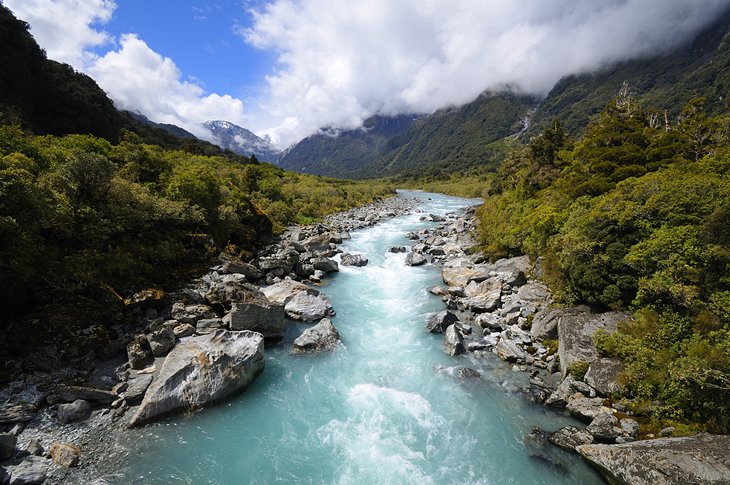
Much of the West Coast region is part of Westland Tai Poutini National Park, which stretches from the mountains of the Southern Alps to the seashore, and encompasses the glaciers of Franz Josef and Fox. Covering some of New Zealand's most pristine native forest areas, the national park is prime territory for adventure fans and nature lovers with a swag of hiking and trekking opportunities.
In particular, the two-day Copland Track winds through the Copland Valley's thick forests of rata trees to Welcome Flat, where trekkers can soak in hot pools while reveling in the mountain peak vistas.
7. Lake Matheson
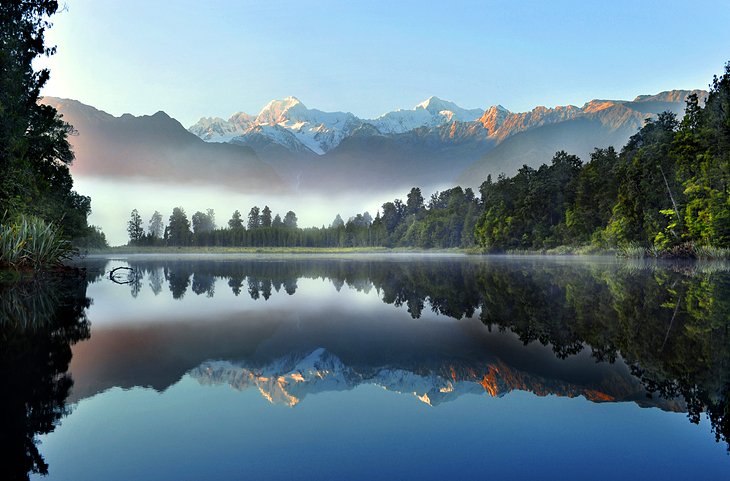
The mirror image of alpine peaks on the surface of Lake Matheson has made it a photographer's dream. On a still day, when the lake's surface is calm, you can capture an astonishingly clear reflection of the snow-capped mountains of Aoraki (Mount Cook) and Mount Tasman in the lake's surface, thanks to the natural brown water color of the lake (caused by algae).
The lake is just a short walk over a suspension bridge through stands of native rimu and kahikatea trees from State Highway 6, near the Fox Glacier village.
8. Okarito
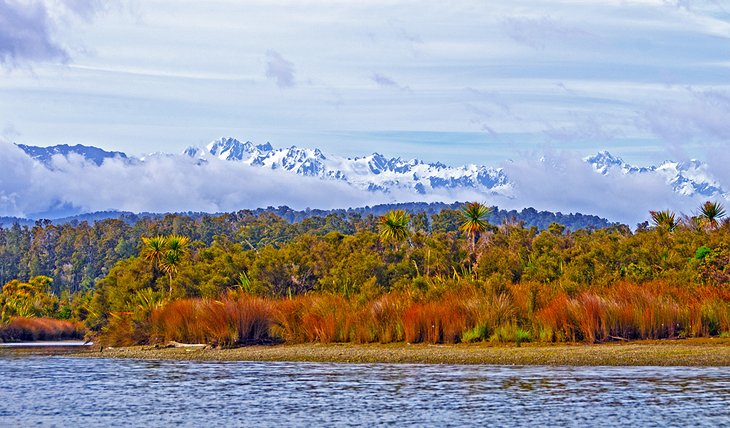
The tiny village of Okarito (population 30) lies scattered across a lagoon beside New Zealand's largest wetlands area. Bird-watchers and nature lovers are in for a treat here, with more than 70 bird species found in the vicinity. Of particular interest, the Okarito forest is home to the rare Rowi kiwi, which travelers can see on an evening guided tour of the Department of Conservation's kiwi sanctuary.
The township is an old gold-mining area and has preserved much of its heritage with the Wharf Shed and Donovan's Store buildings fully restored by the local community. The long sand spit here is a wildly beautiful place where travelers can fully revel in the remote and lonely raw beauty of New Zealand's West Coast
9. West Coast Treetop Walk
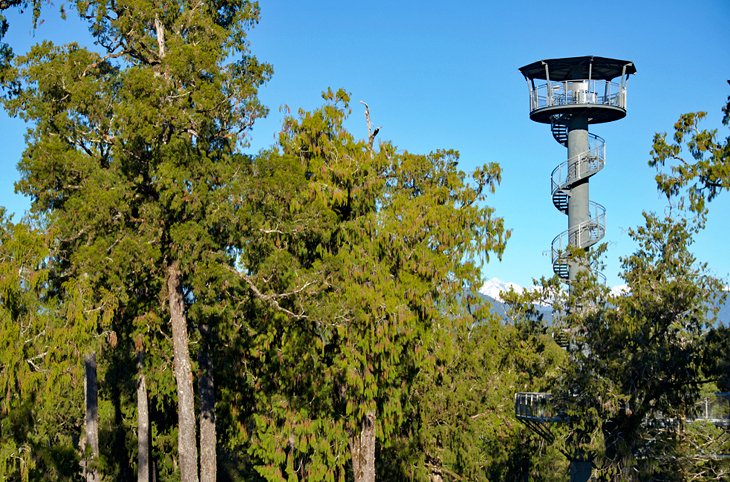
The West Coast Treetop Walk at Lake Mahinapua near Hokitika allows you to experience life in the canopy. A 20-meter-high steel platform traverses the native forest beside Lake Mahinapua, so you can enjoy a bird's-eye view of the rimu and kamahi tree canopy.
Those not afraid of heights can also take the winding staircase up to the 40-meter-high Lookout Tower for panoramic views across the lake, with the Tasman Sea to the west and the snowcapped mountains of the Southern Alps to the east.
Those traveling with toddlers can rest assured that the walk is safe enough to allow children to explore with them, while the raised platforms are also pram and wheelchair accessible. A pleasant café is located on-site, serving refreshments and light meals.
10. Haast
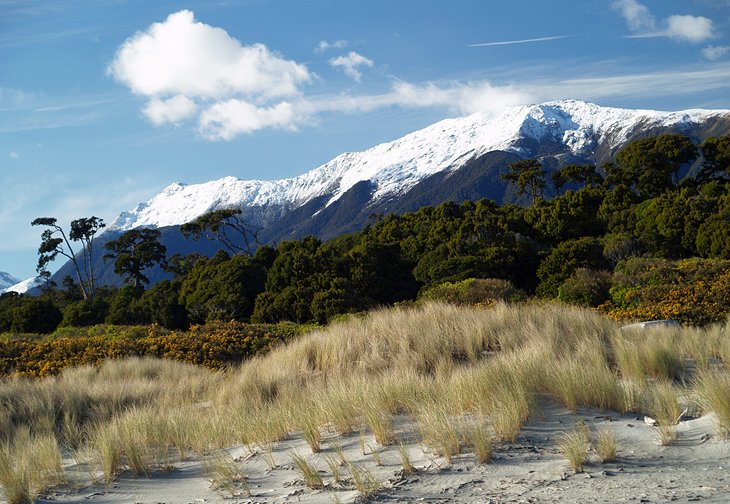
The wild and remote wilderness of the Haast district is the most southern point in the West Coast region. From here, State Highway 6 veers inland, heading to Queenstown. For wilderness lovers, this piece of coastline is speckled with rugged, empty beaches and has a lot to offer, with opportunities to view Fiordland crested penguins at Lake Moeraki, boating trips to spot Hectors dolphins offshore, and abundant forest and wetland walks.
The entire Haast district sits inside UNESCO's South West New Zealand World Heritage Area (which also contains Fiordland), and the township of Haast is one of the gateways to the Mount Aspiring National Park (also part of the World Heritage Area).
11. Westport
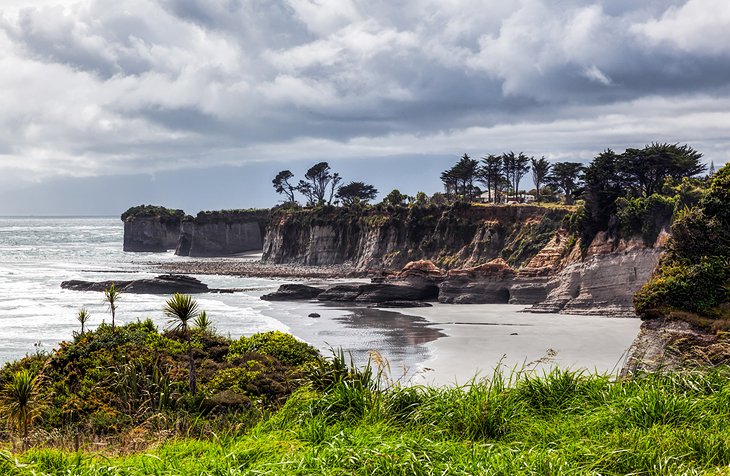
The old mining town of Westport sits in the north of the West Coast and has preserved much of its gold and coal mining heritage. The Denniston Experience tour (15 kilometers north of Westport) allows you to travel down into a coal mine worked in the 1880s, while in Westport itself, there is a small museum dedicated to the local mining industry, which gave birth to the town.
Westport is the base for trips to the seal colony at Cape Foulwind, while the surrounding native forest has plentiful hiking, kayaking, and horseback riding opportunities.
12. The Heaphy Track through Kahurangi National Park
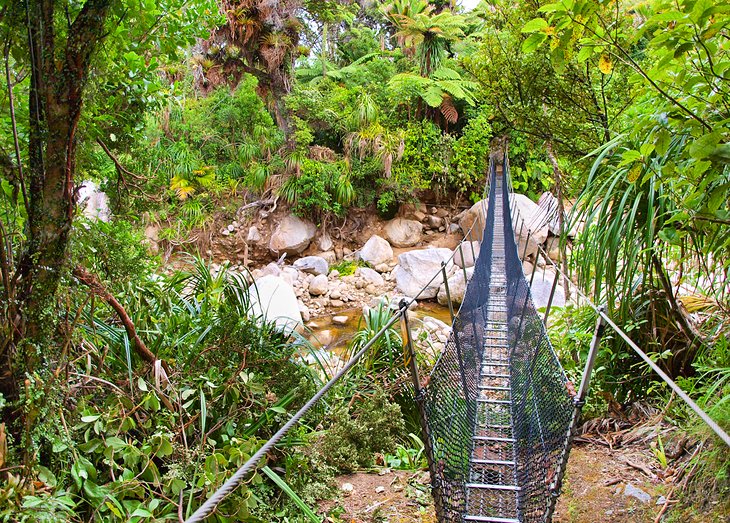
The small, remote township of Karamea sits at the northern point of the region. The town is the southern entry for New Zealand's famous Heaphy Track, a four-to-six-day trek through the Kahurangi National Park that takes you through the West Coast's native forest to the wild tussock countryside of Golden Bay in the South Island's north.
The track is regarded as one of the top such hiking routes in New Zealand, and is certainly worth including in your travel itinerary. It's also become a major mountain biking destination in New Zealand.
Around the Karamea area are interesting limestone caves and arch formations to visit, while the remote and rugged coastline is a wonderful place for short shore-side strolls.
13. The Great Coast Road
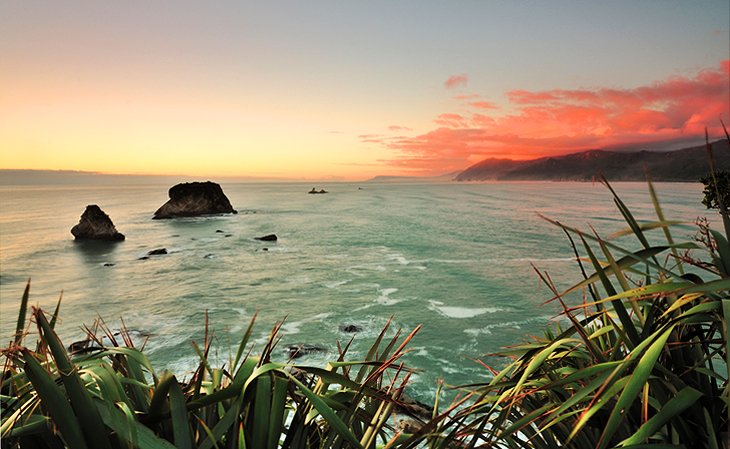
The Great Coast Road is the more romantic name for the northern section of State Highway 6 that has been called one of the top coastal drives in the world. If you are going to hire a car once on your New Zealand trip, this would be the time to do it, as this incredibly scenic 101-kilometer route between Westport and Greymouth is best experienced under your own steam, stopping off for photos or for short strolls along the way.
From Greymouth, the journey takes you through the historic mining town of Runanga, past the gloriously pretty sweep of beach at Rapahoe and the pancake rocks at Punakaiki, to the limestone caves at Charleston. It's a great slice of West Coast scenery.
14. Shantytown Heritage Park
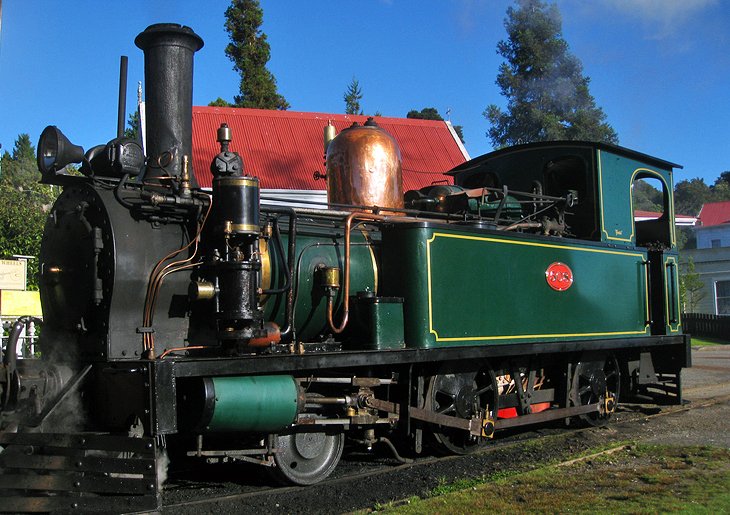
Shantytown Heritage Park, 10 kilometers south of Greymouth, is a great stop on the way to Hokitika, especially if you have children in tow. Set up like one of the West Coast's original gold mining settlements, the heritage park is a good place to experience the history of the region with gold-panning demonstrations (and a chance to try your hand at gold-panning), steam train rides, a functioning steam-driven sawmill, and a small theater with a hologram experience that tells the stories of the gold mining pioneers. There are also a series of short walking trails into the surrounding native forest.
15. Hokitika Wildfoods Festival
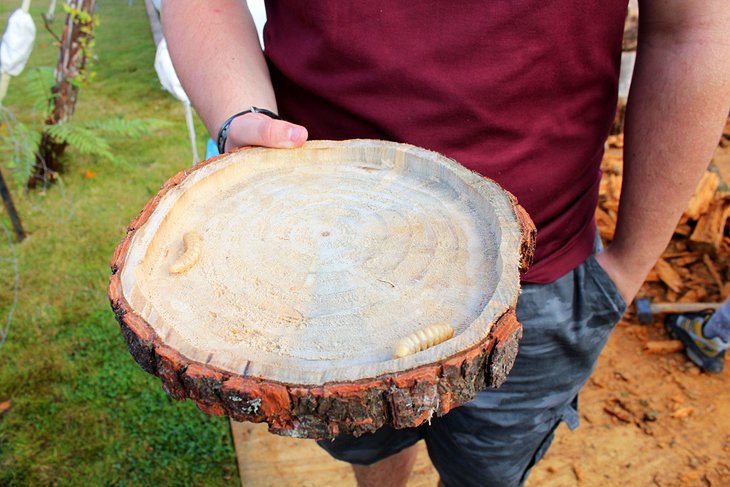
Hokitika's renowned Wildfoods Festival takes place annually in March and is a celebration of the local food, including some more bizarre and unusual offerings, which have made the festival famous. As well as the coast's whitebait, mussels, and plenty of meaty game, you'll also find huhu grubs (the larvae of the endemic huhu beetle), grasshoppers, and snails on the menus.
The festival has plenty of musical performances, as well as cooking demonstrations and comedy routines throughout the day. Up to 10,000 people attend the festival each year, tripling the population of Hokitika.
(thanks to: www.planetware.com)
Comments
Post a Comment